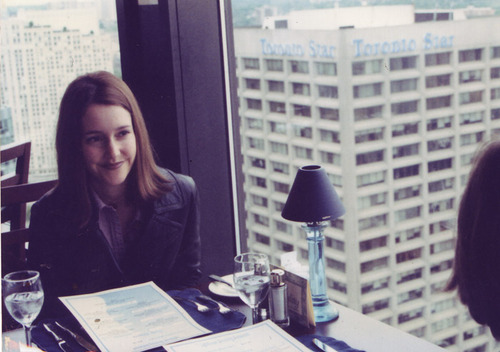
Michelle Orange and I grew up a few neighborhoods apart in the woodsy, conservative university town of London, Ontario and, after high school, we both studied English Lit and Film in Toronto. Yet it wasn’t until 2009, in New York, that we got to know each other. Canadians have a knack for finding each other in that city—even those who, like Michelle, consider it home.
Michelle has published an epistolary travelogue, The Sicily Papers (2006), conceived and edited an issue of McSweeney’s inspired by F. Scott’s Fitzgerald’s notebooks, and has written for The New York Times, The Nation and The Village Voice, among other publications. Last week, FSG published This is Running for Your Life, Michelle’s first collection of essays, which has been described as “whip-smart,” “intriguingly different” and “probing,” and has earned her comparisons to Susan Sontag and John Berger.
The book’s diverse subject matter (the aging Ethan Hawke, Hezbollah, digital photography, etc.), is unified by her keen critical eye, acerbic sense of humor and a writing style that crackles with wit and insight. On any page one is liable to stumble onto cheeky imagery (in a photo of the 2009 inauguration, Barack and Michelle “embrace like lacquered wedding toppers”) and acute cultural diagnoses: “The new American dream is to build a really bitching personal brand, and the result of all that tap dancing on all those individual platforms is a pervasive kind of narrative decadence.”
Yet these essays aren’t hand-wringing missives about the state of things. Each piece braids multiple narrative and thematic threads to create almost an impressionistic interpretation of how we experience, negotiate and document the times in which we live. This is careful, considered writing that demands commensurate thought from its reader. About halfway through the book, I started to appreciate why it had taken us so long to become friends.
Our interview was conducted, to Michelle’s dismay, over Gmail.
– Pasha Malla
I. NOSTALGIA
THE BELIEVER: When I asked to interview you by IM and email, you said, “I feel like one of my few innate skills has been made obsolete.” Why do you prefer the telephone? What’s wrong with computers?
MICHELLE ORANGE: I’m partial to the phone. Probably because at 14, pre-email, I attempted a very dramatic, Wharton-esque jump in social stature, and the telephone was key to its execution. On the phone I could relax and feel and sound like the person I had more trouble being in a group. With boys especially, obviously. You could sidestep the horror of being looked at and try at being liked in a way that felt earned. Plus I am...
You have reached your article limit
Sign up for a digital subscription and continue reading all new issues, plus our entire archives, for just $1.50/month.
Already a subscriber? Sign in




